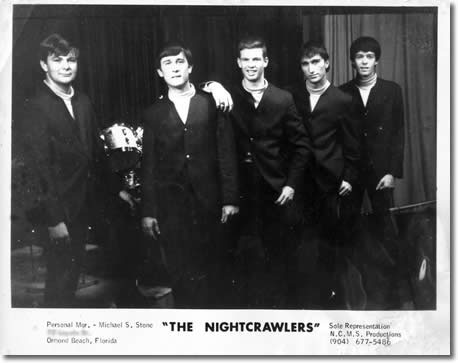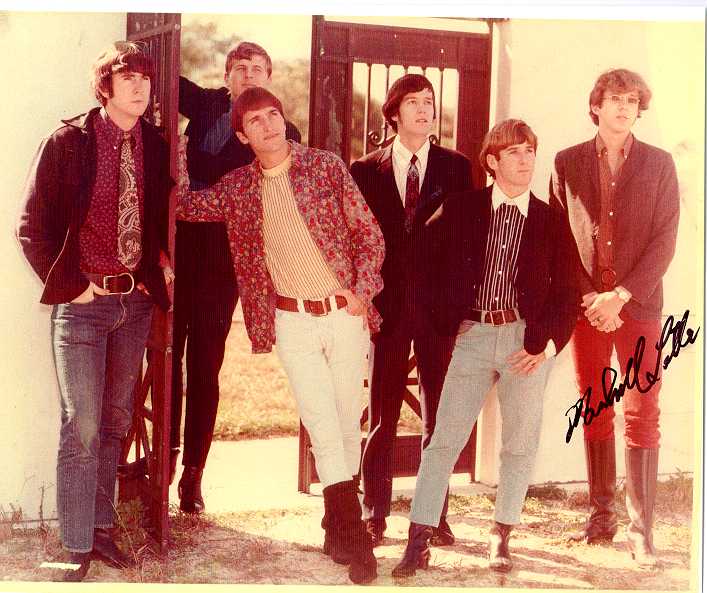NIGHTCRAWLERS


The NightCrawlers were: (above: L->R) Tommy Ruger (drums), Rob Rouse (vocal, harmonica tambourine), Charlie Conlon (bass, vocal), Sylvan Wells (lead guitar), Pete Thomason (rhythm guitar, vocal). Often referred to as the sixth NightCrawler, Mike Stone was brought on board when recording wiz Lee Hazen insisted they needed a manager to get local radio station, WROD, to play their cover of an old Buddy Holly tune called, "Cry". Hazen had been recording the group at his studio "The Cottage" (which was little more than a glassed-in back porch kitchen, covered wall-to-ceiling with egg crates) in Ormand Beach. Mike got the record pressed and soon the guys were hearing themselves on the radio. Stone would eventually get the boys a "deal" with Florida music biz legend, Henry Stone (no relation), who would be very instrumental in getting the bands' records out on the market.
Never considered to be super-pickers, the one thing the NightCrawlers had were original songs - great songs - in a time when very few local bands were writing their own material. Their simple haunting melodies, thought provoking lyrics, and interesting arrangements made the NightCrawlers stand out. Charlie Conlon was the group's writer and was responsible for their biggest hit "The Little Black Egg". That song would spark much controversy among the many who believed the lyrics to be interracial. Conlon recalls writing the song when he was sixteen, about a childhood experience (when he was eight) involving a neighborhood kid who showed him a speckled egg in a bird's nest he had found in a tree in his yard-- the epitome of innocence.

“The Little Black Egg” single was recorded and first released in the late summer of 1965 and moved in and out of regional charts across the country until finally making Billboard (#85) in February 1967, ironically upon its third separate issue. The record had a life of it's own and just wouldn't die. Additionally, the original NightCrawlers line-up had been defunct for almost a year at that point. The band recorded singles on the Lee, Marlin, Scott and Kapp Records labels but none would have the longevity of "The Little Black Egg". That guitar lick was known to every real and imagined guitar player in the South East. If the song could have been a coordinated hit everywhere at once, it would have no doubt been one of the mid-60s "greatest hits".

The original band was only around for a little more than two years. They were only doing it until it came time to go to college. Who knows what would have happened if they had intended to make it a career.
THE LITTLE BLACK EGG
\
The Nightcrawlers found themselves surrounded by a heap of controversy when this single was first released and started to gain a respectable measure of regional airplay in 1965. A few paranoid and uptight buzzcut/flattop/flatland station managers feared it was a surreptitious, “Louie, Louie”-styled 45 as word got around that “The Little Black Egg” held thinly veiled lyrics that housed the far larger degenerate call-to-arms of, (gulp) interracial sex. |
The Nightcrawlers - The Little Black Egg. (Big Beat 2000)
There was definitely something special about "The Little Black Egg." It's such a simple song, and yet so bizarre. The folk-rock guitar riff is positively irresistible, and Chuck Conlon's hillbilly-drawl vocals catch the listener by surprise. The lyrics are so simple that they're almost inscrutable. The listener simply cannot believe that someone would write a song about something so stupid as finding an egg in a tree and becoming the envy of the neighborhood. Certainly, there's no denying that "The Little Black Egg" was a unique and unusual song, and it seems as though no one could resist it, except perhaps the national record charts at the time. To look back, it would appear that the song was a modest failure, peaking at a lowly #85 in Billboard's Hot 100 in 1966. However, the song actually was a big hit. It failed in the national charts because it didn't see airplay in all of the important regional markets at the same time. The single would be climbing the charts in one area just as it was descending the charts somewhere else in the country. In fact, the single entered and left various and sundry regional charts for a span of nearly two years, between 1965 and '67. Nevertheless, "The Little Black Egg" sold well, and left its mark on music history despite its unimpressive performance in Billboard. Following the success of the single, an album was released on Kapp. However, the LP was a hodgepodge of demos, unfinished songs, and other songs which had already been released as local singles over two years earlier. It seems that the Nightcrawlers were just another group who were unjustly ignored due to the idiosyncrasies of the music business. However, this new CD compilation from Big Beat attempts to right the wrongs which plagued the Nightcrawlers' career during their brief experience with the national music scene. The CD The Little Black Egg features 24 tracks, including material released on Kapp and on small local labels before "Egg" made the group famous. There are also several previously unreleased tracks. One of the best songs on the CD is the "Egg" follow-up "A Basket of Flowers," a catchy folk-rocker with great guitar work and fairy-tale lyrics which is punctuated by some fine drumming from Tommy Ruger. Another excellent song is "I Don't Remember," one of their early singles which was released on Scott Records, a small label which released singles by another fine Florida garage band, the Birdwatchers. Some of the other more notable songs on The Little Black Egg include the tuneful ballad "If I Were You," the melancholic pop tune "Cry," and the raucous hillbilly punker "You're Running Wild." The material on this CD which was originally released certainly does somewhat shadow the less interesting previously unreleased tracks, which are composed of competent but uninspired covers such as "Grown Up Wrong," "All Day and All of the Night," and "(Get Your Kicks on) Route 66." A more significant fault of this CD however is a small list of omissions. First of all, only the 3:29 long Kapp album version of "The Little Black Egg" is included; the shorter 2:46 long single version is nowhere to be seen. Also, the song "If You Want My Love" is included only in an unreleased "undubbed" form; the original dubbed version from their Kapp album should also have been included in addition, but was not. Finally, the blurb on the back of the CD saying that it features "all of the recordings by the original band" is somewhat misleading, as by "original band" they mean the group as it existed before any personnel changes took place. Thus, neither side of the 1967 Kapp single "My Butterfly"/"Today I'm Happy" are included. Apart from these few unfortunate omissions however, The Little Black Egg is a fairly complete and concise compilation of the band's entire recordings. As with all of Big Beat's fine releases, The Little Black Egg is nicely packaged, complete with archival band photos and the Nightcrawlers' history as told by the group themselves. It's not an outstanding CD but certainly one worth checking out.

The Nightcrawlers were a product of the post-Beatles garage band explosion that rocked Florida during the mid-60s. Hailing from Daytona Beach, on the eastern Atlantic coast of the state, the NightCrawlers became one of the first Central Florida bands to have a local regional "hit record". They sparked many a flame in the hearts of central Florida wanna-be rock stars during that era.
The Nightcrawlers basically descended from two Daytona area high-school combos: "The Group": composed of Sylvan Wells (bass), Pete Thomason (rhythm guitar), Rob Rouse (sax) and Kentuckian, George Brown (lead guitar) -- and -- "The Craftsmen": a folk group, that featured Charlie Conlon on guitar and vocals. George Brown had played in a band in Louisville called the Nightcrawlers and that is where the name would eventually come from. The groups first gig was in the Fall of 1964 when Sylvan Wells had taken a job for which he had no band. The job was only three days away -- but as luck would have it -- after a few phone calls -- the NightCrawlers were born. The guys managed to make five songs last about two hours.


Often referred to as the sixth NightCrawler, Mike Stone was brought on board when recording wiz Lee Hazen insisted the boys needed a manager to get local radio station, WROD, to play their cover of an old Buddy Holly tune called, "Cry". Hazen had been recording the group at his studio, "The Cottage", (which was little more than a glassed-in back porch kitchen, covered wall-to-ceiling with egg crates) in Ormand Beach. Mike got the record pressed and soon the guys were hearing themselves on the radio. Stone would eventually get the boys a "deal" with Florida music biz legend, Henry Stone (no relation), who would be very instrumental in getting the bands' records out on the market.

Never considered to be super-pickers, the one thing the NightCrawlers had were original songs - great songs - in a time when very few local bands were writing their own material. Their simple haunting melodies, thought provoking lyrics, and interesting arrangements made the NightCrawlers stand out. Charlie Conlon was the group's writer and was responsible for their biggest hit "The Little Black Egg". That song would spark much controversy among the many who believed the lyrics to be interracial. Conlon recalls writing the song when he was sixteen, about a childhood experience (when he was eight) involving a neighborhood kid who showed him a speckled egg in a bird's nest he had found in a tree in his yard-- the epitome of innocence.


listen to their classic hit, Littleblack Egg
“The Little Black Egg” single was recorded and first released in the late summer of 1965 and moved in and out of regional charts across the country until finally making Billboard (#85) in February 1967, ironically upon its third separate issue. The record had a life of it's own and just wouldn't die. Additionally, the original NightCrawlers line-up had been defunct for almost a year at that point. The band recorded singles on the Lee, Marlin, Scott and Kapp Records labels but none would have the longevity of "The Little Black Egg". That guitar lick was known to every real and imagined guitar player in the South East. If the song could have been a coordinated hit everywhere at once, it would have no doubt been one of the mid-60s "greatest hits".
The original band was only around for a little more than two years. They were only doing it until it came time to go to college. Who knows what would have happened if they had intended to make it a career.
